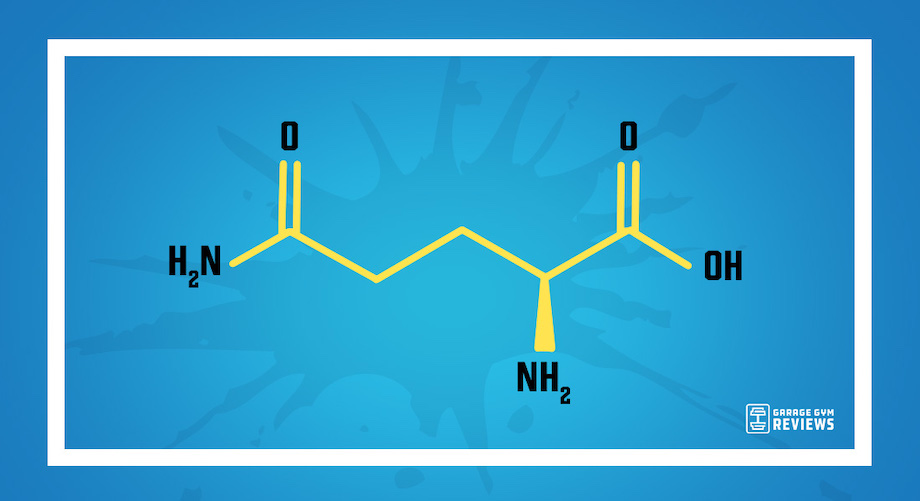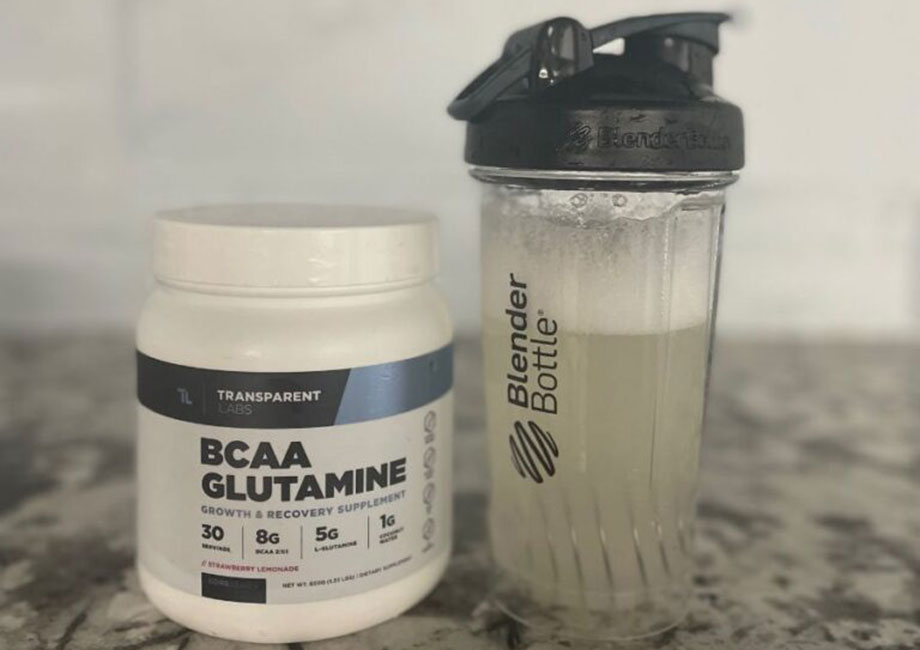Like most amino acids, glutamine as a supplement has been buzzed about in the fitness community. Many believe it helps with muscle growth, athletic performance, gut health, and weight loss. It’s also commonly used to help boost immunity for those who’ve been hospitalized—due to its purported function in helping to speed up recovery—especially for those who have severe wounds1 or burn injuries2.
RELATED: Best Supplements for Muscle Growth
However, the question remains: is the efficacy of glutamine supplements overhyped? Also, can you get glutamine naturally? How do you supplement with glutamine, and is it safe to take daily? A sports dietitian weighs in.
Medical disclaimer: This article is intended for educational and informational purposes only. It is not intended as a substitute for medical advice. For health advice, contact a licensed healthcare professional.
What is Glutamine?
Before we get into it, it’s important to distinguish between glutamine and glutamate, as they are not the same compounds despite having similar names. Glutamate is a non-essential amino acid.
RELATED: The Best Creatine Alternatives
Glutamate functions mainly as a neurotransmitter and is classified as a non-essential amino acid because the body can usually produce enough of it. Your diet typically provides enough glutamate to keep you healthy. Conditional amino acids like glutamine become essential when you’re ill or under stress.

L-glutamine (an isomer of glutamine) is the most abundant amino acid in the human body—mainly due to the high glutamine levels in the muscle tissue. It can also be a source of energy for the body’s cells. Glucose is the primary energy source for most of our cells, but certain rapidly dividing ones, such as immune cells like antibodies, lymphocytes, and intestinal cells, can also utilize L-glutamine. Thus, glutamine contributes to your health in various ways including playing roles in gut health, preventing leaky gut, and promoting optimal immune function.
L-glutamine is the form of the amino acid that is found in food and glutamine powder supplements. Glutamine is naturally found in whole foods, particularly animal proteins like eggs, beef, and dairy. It can also be obtained from plant foods like tofu, corn, rice, and dark, leafy greens. If you aren’t getting enough l-glutamine from these sources, the body can make some on its own.
However, there may be some instances when your body is using up glutamine faster than you can consume, which makes glutamine a conditionally essential amino acid. Dietitians see this in critically ill patients with organ failure or infections from surgery. Due to glutamine’s role in creating immune cells, glutamine supplements may be necessary3 to help your body keep up when your immune system is working overtime.
Benefits of Glutamine
Admittedly, the benefits of glutamine are a bit overhyped in the media. However, there has been some solid science that has shown glutamine can have a positive impact on wellness and athletic performance.
Glutamine for Intestinal Health
Glutamine plays a unique role in enteral nutrition, or nutrition involving intestinal health. This is because the intestines store the l-glutamine from the foods we eat (and glutamine) in the intestinal cells. The intestines then use it to repair themselves in situations such as intestinal permeability (aka leaky gut). So, when glutamine intake lowers, the gut becomes less efficient at repairing itself.
Those dealing with health conditions that result in chronic inflammation or constant damage of the intestinal barrier are most impacted by glutamine or lack thereof. The most common instances occur in individuals who suffer from irritable bowel syndrome, Crohn’s disease, ulcerative colitis and other chronic conditions that affect the gut4.
RELATED: Best Prebiotic Foods
The result of these conditions is that constant inflammation can alter intestinal permeability, thus causing the aforementioned leaky gut. Healthcare providers are divided on whether leaky gut exists; therefore, it’s not a formal medical diagnosis. However, to those who recognize the condition, it’s described as a syndrome in which intestinal permeability is higher than normal, thus letting toxins and bacteria from the gut “leak” into the bloodstream.
Glutamine is not definitively proven to be an effective treatment for leaky gut or irritable bowel syndrome, with some clinical trials showing that long-term l-glutamine supplementation didn’t affect5 barrier function in those with Crohn’s disease.
However, oral glutamine has shown to be effective at easing the harsh effects of chemotherapy6 in those with gastric or colorectal cancer or in other clinical settings when the gut has undergone a great deal of trauma or infection.
In general, there have been many anecdotal accounts of glutamine helping to provide relief and improve symptoms like bloating and cramping in those who experience intestinal distress due to conditions like gluten intolerance or colitis; however, this mechanism of effectiveness hasn’t been firmly established in clinical trials.
RELATED: Best Greens Powder for Bloating
Glutamine for Athletic Performance
Glutamine can slightly benefit your exercise performance as it may reduce the buildup of waste products7 that cause muscle soreness after prolonged exercise. This is especially true when glutamine is consumed along with carbohydrates, likely because both amino acids (the building blocks of protein) and glucose help improve muscle recovery and energy regeneration in the muscles.

Clinical trials that used a combination of glutamine and arginine to give to football players post workout confirmed these findings8 and showed that glutamine may help attenuate muscle breakdown, but only if supplemented in the short term. Another study on 16 male weightlifters9 showed that glutamine enhanced athletic performance by reducing muscle soreness and promoting faster muscle recovery.
All in all, it appears that glutamine may be able to help in bouts of continuous exercise lasting longer than an hour with mixed results. Glutamine doesn’t seem to have a significant effect on muscle protein synthesis.
It’s also important to remember that most athletes consume a high-protein diet rich in BCAAs, EAAs, and other amino acids, including glutamine. Thus, it’s very likely that an l-glutamine supplement would not provide any additional benefit their diet cannot deliver. That said, vegan athletes who do not consume animal products may have lower glutamine stores than their omnivorous counterparts.
Glutamine for the Immune System
Due to its role in providing fuel10 to our lymphocytes (white blood cells), antibodies, and certain enzymes, glutamine plays an integral part in immune health. Despite being the body’s most abundant amino acid, glutamine levels can become low in the blood following major trauma11, such as injury, infection, or surgery.
If you’ve ever experienced a lengthy hospital stay, suffered a major injury, or had invasive surgery, you probably lost a lot of muscle by the time you recovered. That wasn’t just because of immobility, but because of the body’s need for glutamine being greater than its ability to produce12 this conditionally essential amino acid.
The immune system may not operate optimally when glutamine levels are low, thus increasing risk of illness13. For these reasons, registered dietitians will often recommend higher protein intake for injured athletes or those recovering from surgery, burns, and other trauma.
However, eating high-quality protein isn’t always possible with critically ill patients. When you’re feeling sick and recovering, it’s probably the one time in your life that the smell (or even the thought of) a thick steak or a juicy chicken breast could make you feel even worse. This is where l-glutamine supplements come in.
Studies have shown that l-glutamine supplements delivered intravenously can improve wellness and shorten hospital stays in those who have had surgery14. That is all great, but it has to be said that if you’re reading this, you’re probably not critically ill at this moment. Science has shown that glutamine’s role in preventing muscle loss and boosting immune health isn’t as strong in healthy individuals15 who can synthesize enough glutamine.
Potential Side Effects of Glutamine
As glutamine is an amino acid found in a wide variety of foods and produced naturally in the body, when it is taken short-term in supplement form, no significant side effects have been reported when dosed as instructed. It’s rare, but very high doses taken daily may cause dizziness, rash, or rapid heartbeat15.
Science also suggests long-term supplementation may affect how the body metabolizes amino acids15. One study showed that a daily intake of over 40 grams can impair the body’s ability to make its own glutamine15. However, more research is needed, and this effect may not be an issue if you are not supplementing with creatine in high doses.
It’s not confirmed if glutamine supplements are safe while pregnant or breastfeeding, but the amino acid supplement isn’t recommended for those with liver disease16 or kidney disease. Consult with your healthcare provider before taking any supplement, especially if you suffer from chronic health conditions, are pregnant, or take prescription medications.
How to Take Glutamine
As for L-glutamine dosage, it’s difficult to get the “perfect” amount since requirements vary depending on your diet and how much muscle mass you carry. Recommendations for the optimal dose of oral glutamine vary between 5 to 10 grams. However, doses as high as 30 grams per day17 have been shown to be well-tolerated by healthy adults without any adverse side effects.

The most common way to use glutamine supplements is in powder form, which can be mixed into food or at least 8 ounces of a beverage. In general, most dietary supplements tend to be better tolerated when taken with food.
Glutamine Supplements: Final Thoughts
Healthcare professionals have been using glutamine supplements as a treatment to help with gut health and immune function in critically ill patients for quite some time. Though it may have a modest effect on endurance athletic performance, the efficacy of glutamine on muscle mass and protein synthesis is not as profound as many think.
While nutritional supplementation of glutamine rarely comes with side effects, it’s not necessary to take glutamine powder if you are a healthy adult who eats animal products like meat, fish, and dairy often. Those who follow a vegan diet may see more profound benefits, but those who get the most use from glutamine are those who suffer from some sort of inflammatory bowel disease like ulcerative colitis.
However, the claims that glutamine reduces the bloating and GI distress that comes with these conditions are largely anecdotal and not firmly established by science.
Glutamine Supplements: FAQs
What are the benefits of taking glutamine?
The health benefits of glutamine are mild and most profound in a clinical setting. However, healthy adults may see modest benefits in immune health, gut health, and endurance exercise.
Is it OK to take l-glutamine daily?
As long as it’s taken in recommended doses, daily glutamine nutritional supplementation is safe.
Why do bodybuilders take glutamine?
Some bodybuilders may take glutamine to help with muscular endurance, helping them lift for longer periods of time.
What’s the difference between glutamine and l-glutamine?
Most amino acids come in two forms, and glutamine can either be d-glutamine or l-glutamine. L-glutamine is the form that is present in dietary supplements, food, and the body. Thus, this is the form that many will refer to interchangeably as either “l-glutamine” or “glutamine.”
These statements have not been evaluated by the Food and Drug Administration. This product is not intended to diagnose, treat, cure, or prevent any diseases.
References
- Apostolopoulou A, Haidich AB, Kofina K, et al. Effects of glutamine supplementation on critically ill patients: Focus on efficacy and safety. An overview of systematic reviews. Nutrition. 2020;78:110960. doi:10.1016/j.nut.2020.110960
- Arribas-López E, Zand N, Ojo O, Snowden MJ, Kochhar T. The Effect of Amino Acids on Wound Healing: A Systematic Review and Meta-Analysis on Arginine and Glutamine. Nutrients. 2021 Jul 22;13(8):2498. doi: 10.3390/nu13082498. PMID: 34444657; PMCID: PMC8399682.
- Berger MM, Binz PA, Roux C, et al. Exudative glutamine losses contribute to high needs after burn injury. JPEN J Parenter Enteral Nutr. 2022; 46: 782–788 https://doi.org/10.1002/jpen.2227.
- Benjamin J, Makharia G, Ahuja V, et al. Glutamine and whey protein improve intestinal permeability and morphology in patients with Crohn’s disease: a randomized controlled trial. Dig Dis Sci. 2012;57(4):1000-1012. doi:10.1007/s10620-011-1947-9
- Den Hond E, Hiele M, Peeters M, Ghoos Y, Rutgeerts P. Effect of long-term oral glutamine supplements on small intestinal permeability in patients with Crohn’s disease. JPEN J Parenter Enteral Nutr. 1999;23(1):7-11. doi:10.1177/014860719902300107
- Li Y, Ping X, Yu B, Liu F, Ni X, Li J. Clinical trial: prophylactic intravenous alanyl-glutamine reduces the severity of gastrointestinal toxicity induced by chemotherapy–a randomized crossover study. Aliment Pharmacol Ther. 2009;30(5):452-458. doi:10.1111/j.1365-2036.2009.04068.x
- Carvalho-Peixoto J, Alves RC, Cameron LC. Glutamine and carbohydrate supplements reduce ammonemia increase during endurance field exercise. Appl Physiol Nutr Metab. 2007;32(6):1186-1190. doi:10.1139/H07-091
- Bassini-Cameron A, Monteiro A, Gomes A, Werneck-de-Castro JP, Cameron L. Glutamine protects against increases in blood ammonia in football players in an exercise intensity-dependent way. Br J Sports Med. 2008;42(4):260-266. doi:10.1136/bjsm.2007.040378
- Legault Z, Bagnall N, Kimmerly DS. The Influence of Oral L-Glutamine Supplementation on Muscle Strength Recovery and Soreness Following Unilateral Knee Extension Eccentric Exercise. Int J Sport Nutr Exerc Metab. 2015;25(5):417-426. doi:10.1123/ijsnem.2014-0209
- Demling RH. Nutrition, anabolism, and the wound healing process: an overview. Eplasty. 2009;9:e9.
- van Zanten AR, Dhaliwal R, Garrel D, Heyland DK. Enteral glutamine supplementation in critically ill patients: a systematic review and meta-analysis. Crit Care. 2015;19(1):294. Published 2015 Aug 18. doi:10.1186/s13054-015-1002-x
- Mittendorfer B, Gore DC, Herndon DN, Wolfe RR. Accelerated glutamine synthesis in critically ill patients cannot maintain normal intramuscular free glutamine concentration. JPEN J Parenter Enteral Nutr. 1999;23(5):243-252. doi:10.1177/0148607199023005243
- Calder PC, Yaqoob P. Glutamine and the immune system. Amino Acids. 1999;17(3):227-241. doi:10.1007/BF01366922
- Eroglu A. The effect of intravenous alanyl-glutamine supplementation on plasma glutathione levels in intensive care unit trauma patients receiving enteral nutrition: the results of a randomized controlled trial. Anesth Analg. 2009;109(2):502-505. doi:10.1213/ane.0b013e3181a83178
- Holecek M. Side effects of long-term glutamine supplementation. JPEN J Parenter Enteral Nutr. 2013;37(5):607-616. doi:10.1177/0148607112460682
- Hatami B, Saffaei A, Jamali F, Abbasinazari M. Glutamine powder-induced hepatotoxicity: it is time to understand the side effects of sports nutritional supplements. Gastroenterol Hepatol Bed Bench. 2020 Winter;13(1):86-89. PMID: 32190229; PMCID: PMC7069532.
- Gleeson M. Dosing and efficacy of glutamine supplementation in human exercise and sport training. J Nutr. 2008;138(10):2045S-2049S. doi:10.1093/jn/138.10.2045S






